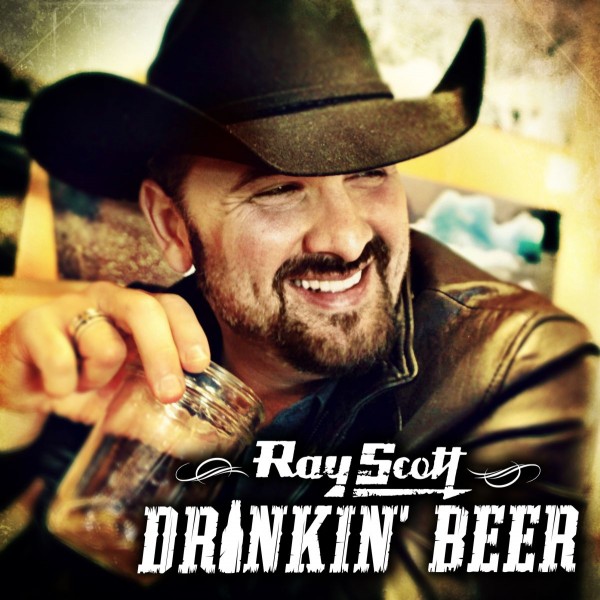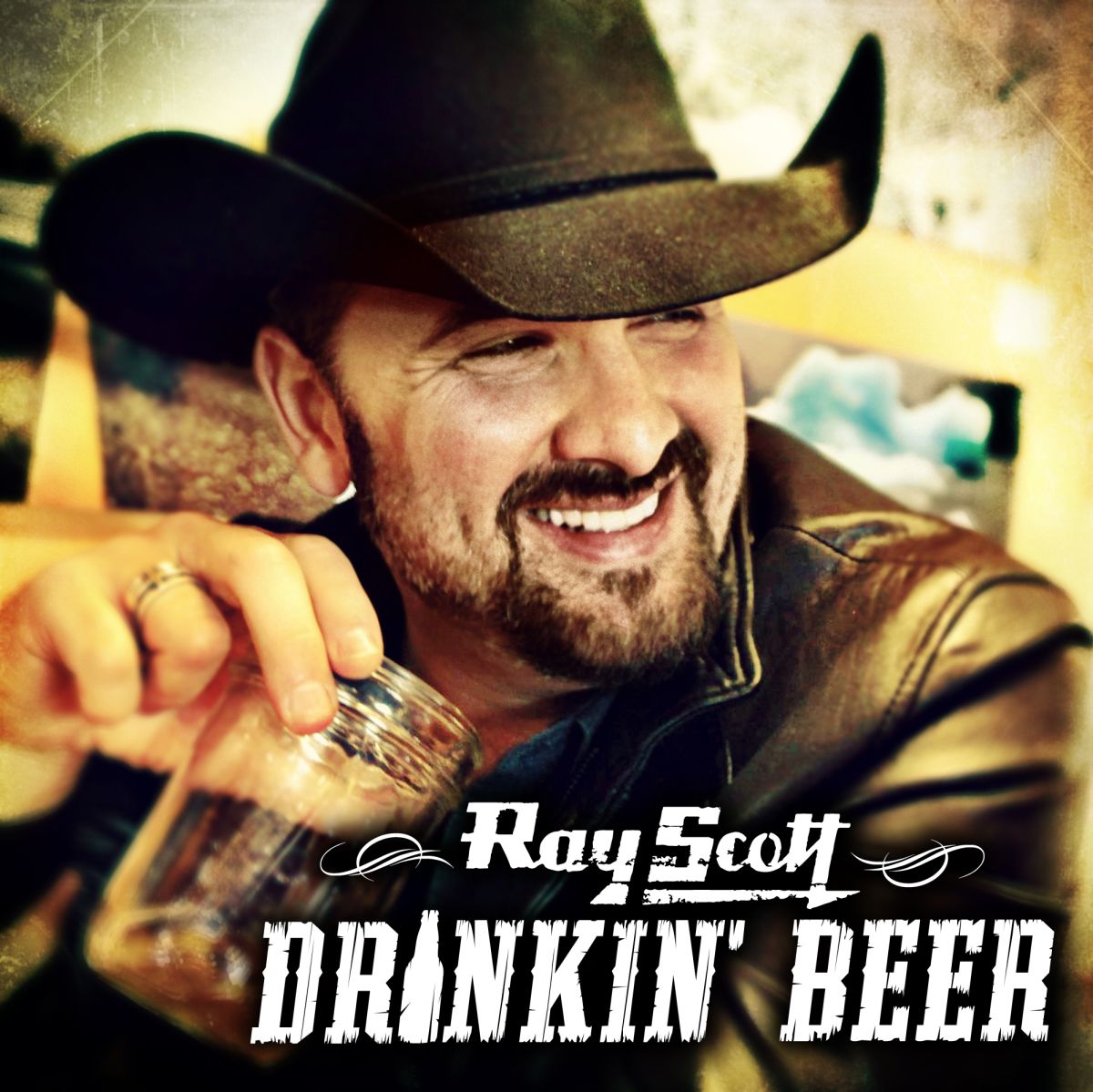LRM Interview: Ray Scott: “I have figured out my strengths and weaknesses as a songwriter.”
10 years ago Liv Carter Comments Off on LRM Interview: Ray Scott: “I have figured out my strengths and weaknesses as a songwriter.”

Country singer and songwriter Ray Scott has seen just about all sides of the Nashville music industry. Now, happily independent and ready with a new album due later this year, he discusses new single ‘Drinkin’ Beer,’ his development as a writer, how to stay visible in the current country market, and the process of making the new album.
This interview was minimally edited for clarity.
LRM: You co-wrote the new single with Tony Mullins. What was the aim with that write?
Ray Scott: I’ve known of Tony for a long time because of his other successes. We had gone on a fishing trip at the time I was at Universal Publishing, so I had hung out with him a little bit. I booked this write with him, and it was our first time writing together. I went to his place and he has this great pond with a club house and a little dock, it has just a great ambiance about it. He started playing the guitar lick out of the blue, and I had the idea. It was pretty easy, pretty quick. It was mainly a lot of fun.
LRM: Was writing that idea part of a larger plan for a new direction you’re seeking?
RS: Honestly, it wasn’t. I probably got more than one drinking song on every album I’ve done. It was just a typical day of getting together with a writer, and having a good rapport with him. We just wrote what was in the air; it was kind of festive and fun. It all happened organically, which is often how the best ones come about.
LRM: In the press material you said you feel like you are regrouping in your career, also artistically. What did you mean by that?
RS: Well, part of it is the new production approach I’ve been taking. I started working with Dave Brainard on my last album, Rayality, and we’ve had some success through Sirius/XM. It became a new chapter for me. You know, I was on Warner Bros for a while, was independent for a while, but this time around it was kind of a new direction based on some new success I had. We weren’t necessarily thinking in terms of what Nashville would accept or what radio would play. It was about what, artistically, was coming out naturally. I feel like I have a lot more freedom to do just that.
LRM: Where do you slot yourself into a market now?
RS: From a fan perspective, I seem to fit within the country music boundaries just as well as a lot of other people. It’s all about whether people want to listen to it and dig it. I’m a little more country, at least in my definition of it, as I did when I moved to town. It’s not as infused with rock and pop of the 1980s as some of what we hear nowadays. That’s mainly because the artists I was influenced by were artists that came before that. It was more from the Johnny Cash, Waylon Jennings, Jerry Reed era. That came naturally to me. I kind of just get it honest, I suppose.
LRM: Is that honesty what attracted you to it, and is that the element you also try to bring to your own music?
RS: It is! I didn’t start as a country music fan when I was a kid, I went through my rebellious period of hard rock. My dad was a country singer and whatever your parents are into can’t be cool. I later realized that for my upbringing, for my sensibilities, there’s really no other format that comes close to fitting me. Once I got a grasp on that, I was off to the races. I still really appreciate the traditional country and the storytelling. I’m not as much into the lighter stuff you hear on the radio these days. But to each their own. I think, ultimately, I fit somewhere, I have a niche, and I have been able to sustain a career based on that.
LRM: How do you find your audience, how do you find the people willing to connect with what you’re doing?
RS: It’s just whoever shows up. I’m often surprised about that. I can’t go out with an age-specific show in mind because my audience ranges from young kids to older people. It’s just about whatever appeals to them, whether it’d be the vocals, or the storytelling, or that fact that there’s a lot of steel guitar. I’m continuously surprised and happy to see the wide range of people that tend to be drawn to it. It’s definitely not pointed to any one single demographic.
LRM: You’re continuing to work with Dave Brainard on this record. What does he bring to your career as a producer?
RS: Dave’s whole objective is to bring as much as he can to it, but at the same time staying out of the way of the material. He’s not overproducing, not bringing too much attention to what he’s doing, he’s trying to find the best way in his mind to make the song as good as it can be, and the performance as good as it can be. I think he has a really great sensibility with that. He has a lot of different ideas when it comes to percussion and arrangement. The production I was doing before was a little more straightforward, which was great, but Dave has figured out a way to bridge the gap between the commercial and what is a little more inventive. I think he will continue to do that with more artists, and eventually people will see him as one of the best producers in town.
LRM: What have you seen change about your writing over the years that now allows you to be in a position to say “I know what I want to say, and I know how to say it”?
RS: Well, that’s exactly it. Early on, you lock on to a few things here and there, and you start forging the correct path for you. I would write song after song after song, and when you listened back there were some that were more believable because I’d captured whatever it is that I do best. Not all songs you write are like that. These days it’s not any easier necessarily to do that, but I have more of an instinct to go in the right direction. I think I have figured out my strengths and weaknesses, so it’s easier to get it done when I get the right ideas. The biggest challenge is still [to find] what you’d consider a worthy, or a hit idea. Anybody who is worth their salt as a songwriter can sit down and write a completed song that has all the write elements, but it doesn’t mean it’s going to be special. So, the special ideas are pretty rare. I think I’ve just gotten better at noticing them.
LRM: So it’s not that you now have more good ideas, you’re just better at cutting out the not so good ideas.
RS: Yes, I’m better at trimming the fat these days than I used to be, especially for myself. I’m in a unique position where I’m not necessarily getting up every day to try to write songs for other artists to record, because honestly, I don’t know if I could do that so well.
LRM: How do you differentiate between the quality of ideas? Can you identify that or is it just instinct?
RS: It’s instinct really. I think it’s subconscious. These days, if I take the time to sit down and finish a song, most of the time I think it’s at least good enough to finish. If it’s not quite good enough, I think instinctively I sort of just go cold on it and it ends up not even being finished. There have been a lot of those really, when I have the idea I think it’s great but then three days go past and I don’t even think about it anymore.
LRM: What material on the new record are you particularly excited about people hearing?
RS: Well, all of it really. [smiles] We went down a long list of stuff but narrowed it down. Not only do I love all the songs we’ve recorded, but I also feel like they can do their part as standing out as a separate vignette. None of them sound the same, none of them are about the same thing. I still like the look of the album, the complete work as a piece of art. I still appreciate that a lot, and it is kind of lost on the younger generation. I think that’s unfortunate because they don’t get to grasp and soak it in the way we used to. I still believe in the album format, so when you make one you have to think about what would make it as diverse and interesting as possible. We still have to play the iTunes game because it is important to get sales and be visible. But I like to think beyond those perimeters. We don’t really think about singles before we record, we choose after. It’s not really about “what would radio play?” but what we think is going to catch the ears of the listeners.
LRM: How do you see the role of terrestrial radio and things like Sirius/XM for promoting this album?
RS: Right now for me it’s all about XM, the internet, and secondary radio. We’re not competing or even trying to compete with the majors, that’s pointless. We want to put what we love out there. The people who love it will buy it and come to shows, and that’s our goal. We are not under any pretense that we’re out there trying to do the same thing as the big guys. That’s not on my radar.
LRM: What are the plans for the rest of 2014?
RS: We have more stuff coming together in the US, and are already looking forward to another busy year next year. I have another European tour coming up in August, I’ll be over there for 3 weeks again. Then we’re gonna come back here and hit the ground running, playing clubs all over the US.
For more on Ray Scott and upcoming tour dates, please visit rayscott.com.
Liv Carter
She holds several certificates from Berklee College of Music, and a certificate in Positive Psychology from UC Berkeley.
Her main influences are coffee, cats, and Alexander Hamilton.
Latest posts by Liv Carter (see all)
- Well yes, racism, but it’s more complicated - February 13, 2017
- Black River Entertainment had a great reason to party! - October 25, 2016
- Keith Urban returns to the States for US arena leg of his “ripCORD WORLD TOUR 2016” - October 10, 2016


